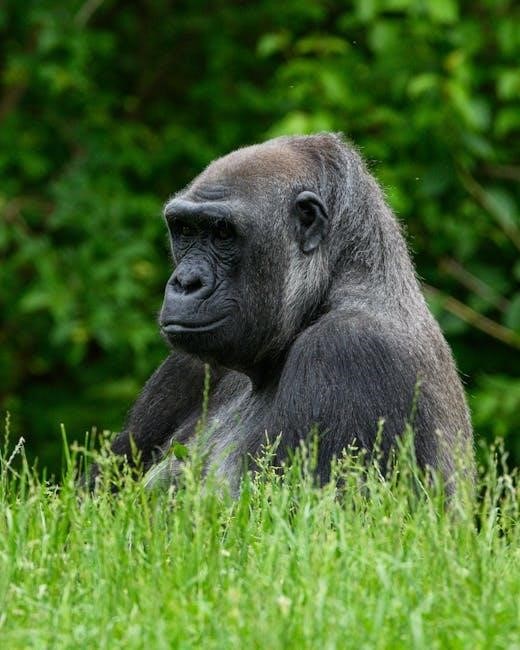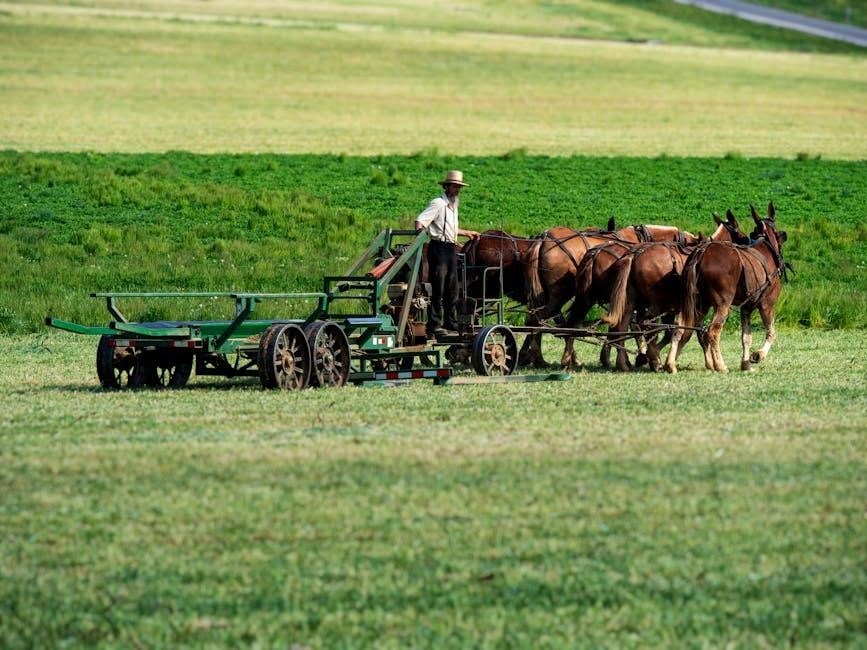Upton Sinclair (1878-1968) was a renowned American author and activist, best known for his novel The Jungle, which exposed the harsh realities of the meatpacking industry. His work remains widely available in PDF format for free, ensuring its lasting impact.
1.1 Overview of Upton Sinclair’s Life and Work
Upton Sinclair (1878-1968) was a prominent American writer, socialist, and political activist. Born in Baltimore, Maryland, Sinclair grew up in a family that struggled financially, which deeply influenced his writing and worldview. He became known for his investigative journalism and novels that exposed social injustices. Sinclair’s work often highlighted the plight of the working class and the exploitation of immigrants. His most famous novel, The Jungle, published in 1906, shocked the nation by revealing the harsh conditions in the meatpacking industry. This novel not only brought him widespread recognition but also led to significant reforms in food safety regulations. Sinclair’s writing career spanned over six decades, during which he authored numerous novels, essays, and articles. His commitment to socialism and his ability to weave compelling narratives made him a pivotal figure in American literature and activism.
1.2 Historical Context of “The Jungle”
The Jungle, written by Upton Sinclair in 1906, is set against the backdrop of the late 19th and early 20th centuries, a period marked by rapid industrialization and mass immigration in the United States. The novel reflects the harsh realities faced by immigrant workers, particularly in the meatpacking industry in Chicago. Sinclair’s work was deeply influenced by his socialist beliefs and his desire to expose the exploitation of laborers. The novel’s graphic descriptions of unsanitary conditions and worker mistreatment shocked the public, leading to widespread outrage and calls for reform. Published during the Progressive Era, The Jungle aligned with the movement’s goals of addressing social and economic inequalities. The book’s impact was so significant that it prompted federal investigations and the eventual passage of the Meat Inspection Act of 1906. Today, the novel remains a powerful critique of capitalism and a testament to the struggles of immigrant workers, with its PDF version widely available for educational purposes.
The Plot of “The Jungle”
The Jungle by Upton Sinclair follows the journey of Jurgis Rudkus, a young Lithuanian immigrant, and his family as they navigate the brutal realities of working-class life in Chicago. The novel explores their struggles in the meatpacking industry, highlighting exploitation, poverty, and tragedy, ultimately revealing the devastating consequences of unchecked capitalism. The story is a powerful depiction of immigrant life and the harsh conditions of industrial labor, available for readers in PDF format.
2.1 Main Characters in “The Jungle”
The novel revolves around Jurgis Rudkus, a young Lithuanian immigrant seeking a better life in America. His family, including his wife Ona, her cousin Marija Berczynskas, and his father Antanas, endure immense hardships. Jurgis embodies the struggle for survival, while Marija represents resilience and sacrifice. Ona symbolizes the tragic consequences of exploitation. Other key characters include Phil Connor, a corrupt factory foreman, and Tamoszius Kuszleika, a musician who offers fleeting joy. These characters highlight the broader immigrant experience and the brutal realities of industrial labor, as detailed in the PDF version of The Jungle. Their stories underscore Sinclair’s critique of capitalism and the fight for worker rights, making the novel a timeless commentary on social injustice.
2.2 Summary of the Novel’s Plot
The Jungle, written by Upton Sinclair, follows the journey of Jurgis Rudkus, a young Lithuanian immigrant, and his family as they move to Chicago in search of a better life. The novel exposes the harsh realities of working-class life in the early 20th century, particularly in the meatpacking industry. Jurgis and his family face relentless exploitation, poverty, and tragedy as they struggle to survive. The story details their descent into despair, with Jurgis eventually losing his family and hope. However, the novel concludes on a note of optimism as Jurgis discovers socialism, offering a potential path to collective liberation. The PDF version of The Jungle vividly captures Sinclair’s indictment of capitalism and his call for social reform, making it a powerful read for those exploring the struggles of immigrant workers and the fight for justice. The narrative remains a stark reminder of the human cost of industrial exploitation.

Themes and Messages in “The Jungle”
The novel explores the exploitation of immigrant workers, harsh realities of the meatpacking industry, and the struggle for survival. It highlights poverty, injustice, and advocates for socialism as liberation. The PDF captures Sinclair’s critique of capitalism and industrialization.

3.1 The Struggle of Immigrant Workers

Upton Sinclair’s The Jungle vividly portrays the harsh realities faced by immigrant workers in early 20th-century America. The novel highlights their exploitation, poor working conditions, and meager wages in the meatpacking industry. Immigrants, like Jurgis Rudkus, endure long hours, unsafe environments, and brutal treatment, struggling to survive. Sinclair exposes how industrialization and capitalism preyed on vulnerable workers, denying them dignity and hope. The PDF version of the book remains a powerful critique of systemic injustice, offering insight into the lives of those exploited. It underscores the resilience of immigrants and their fight for a better future, making it a timeless commentary on labor rights and social inequality. The novel’s vivid descriptions ensure that the plight of these workers is not forgotten, even in modern times; Sinclair’s work continues to resonate, advocating for justice and fairness in the workplace. The PDF format ensures accessibility to this critical commentary.
3.2 Exposing the Meatpacking Industry
Upton Sinclair’s The Jungle is renowned for its shocking exposé of the early 20th-century meatpacking industry. The novel reveals the horrifying conditions in factories, where workers labored in filthy, dangerous environments. Sinclair vividly describes how meat was contaminated, often mixed with diseased animal parts or even rat infestations. These revelations outraged the public, as consumers realized their food was unsafe. The PDF version of the book details the industry’s disregard for worker and consumer well-being, highlighting practices like using chemicals to mask spoilage. Sinclair’s descriptions of slaughterhouses and processing plants led to widespread disgust, prompting calls for reform. The novel’s impact was so profound that it influenced the passage of the 1906 Meat Inspection Act, improving food safety regulations. The PDF edition remains a crucial resource for understanding Sinclair’s critique of industrial exploitation. His work continues to highlight the importance of transparency in the food industry.
The Impact of “The Jungle”
The Jungle sparked nationwide outrage, leading to reforms in food safety and labor practices. Its exposure of the meatpacking industry prompted the 1906 Meat Inspection Act, improving public health standards significantly.
4.1 Public Reaction and Outrage
The publication of The Jungle in 1906 ignited widespread public outrage and shock across America. The graphic descriptions of unsanitary conditions, animal remains in food products, and the exploitation of workers in the meatpacking industry horrified readers. Many were unaware of the appalling practices in the industry, and Sinclair’s vivid portrayal exposed the grim reality. The public’s anger was further fueled by the realization that their food was not only unsafe but also handled with utter disregard for hygiene. Sinclair’s intent was to highlight the plight of immigrant workers, but the public’s reaction primarily focused on food safety rather than labor exploitation. This shift in focus, while unintended, still had a profound impact, as it led to significant reforms and heightened awareness of industrial practices. The novel’s influence was so strong that it remains a pivotal moment in American literary and social history.
4.2 Changes in Food Safety Regulations
The uproar caused by The Jungle led to significant changes in food safety regulations. President Theodore Roosevelt, moved by Sinclair’s exposé, launched an investigation into the meatpacking industry. The findings confirmed the horrifying conditions described in the novel, prompting immediate legislative action. In 1906, Congress passed the Meat Inspection Act, which mandated federal oversight of meatpacking facilities to ensure sanitary practices and protect consumers. Additionally, the Pure Food and Drug Act was enacted, establishing the precursor to the modern FDA and requiring accurate labeling of food products. These laws marked a turning point in consumer protection and remain foundational to food safety standards today. Sinclair’s work not only raised public awareness but also directly influenced policy, leaving a lasting legacy in the fight for safer and more transparent food production practices in the United States.

The PDF Version of “The Jungle”
The Jungle by Upton Sinclair is widely available as a free PDF download from platforms like Project Gutenberg and other online archives, ensuring easy access to this classic novel for readers worldwide.
5.1 Availability of the PDF Online

The PDF version of Upton Sinclair’s “The Jungle” is readily available online through various platforms. Websites like Project Gutenberg and Google Books offer free downloads without registration. Additionally, libraries such as the University of Toronto’s collection provide access to the novel in PDF format. The book is also accessible through educational platforms that focus on classic literature, ensuring its availability for students and researchers. Many online archives, including those dedicated to banned books and historical texts, host the novel. The PDF format allows readers to access the book on multiple devices, making it a convenient option for modern readers. This widespread availability reflects the novel’s enduring relevance and its impact on public awareness of social issues. As a result, The Jungle remains easily accessible to anyone interested in exploring its powerful narrative and historical significance.

5.2 Benefits of Reading the PDF Edition
Reading The Jungle in PDF format offers several advantages for readers. Firstly, the PDF edition is widely available for free, making it accessible to anyone with an internet connection. This cost-free access ensures that the novel’s powerful message reaches a broad audience. Additionally, the PDF format is compatible with various devices, allowing readers to engage with the text on smartphones, tablets, and computers. The digital version also enables easy navigation, with features like bookmarks and search functions. Furthermore, the PDF preserves the original formatting of the book, maintaining the integrity of Sinclair’s writing. For educational purposes, the PDF edition is particularly useful, as it can be easily shared and referenced. Overall, the PDF edition of The Jungle provides a convenient and accessible way to experience this landmark novel.
- Free and widespread availability
- Compatibility across multiple devices
- Easy navigation and search functionality
- Preservation of original formatting
- Ideal for educational and research purposes
Upton Sinclair’s The Jungle remains a landmark novel in American literature, exposing the harsh realities of immigrant life and the meatpacking industry. Its availability in PDF format ensures that Sinclair’s powerful message continues to reach modern readers. The novel’s impact led to significant reforms, highlighting the importance of literary activism. Today, the PDF edition allows for easy access, making it a valuable resource for education and reflection. Sinclair’s work serves as a timeless reminder of the struggles of the working class and the need for social change.
- A landmark novel in American literature
- Continued relevance through PDF accessibility
- Historical impact on labor and food safety reforms
- A powerful tool for education and reflection
- A timeless call for social justice









































































